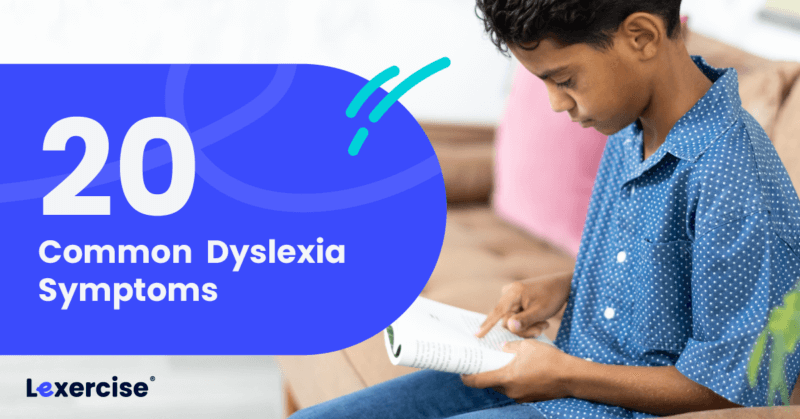20 Common Dyslexia Symptoms: Symptoms of Dyslexia in Kids
Written by Sandie Barrie Blackley, Speech-Language Pathologist
Published on March 17, 2023
Dyslexia Symptoms and Behaviors of Dyslexic Children.
Are you wondering about the most common dyslexia symptoms? Children can begin to show signs of dyslexia as early as the preschool years. While every person with dyslexia is unique, there are common symptoms that can serve as red flags for dyslexia. The dyslexia specialists at Lexercise have compiled a list of 20 of the most common symptoms to help you identify if your child is at risk.
Common Dyslexia Symptoms
Every parent wants to help their child improve confidence and performance in reading, writing, and spelling. Understanding some common symptoms of dyslexia can be an essential step in this journey. These dyslexia symptoms are listed in no particular order.

Speaking
- Problems pronouncing certain words
- Omitting sounds or letters when reading and writing words
- Limited awareness of the speech sounds in words
- Problems retrieving words
Listening
- Strong listening comprehension and weak reading comprehension
Working Memory
- Difficulty following sequenced instructions
- Difficulty with memorization (such as memorizing times tables)
Stress, Anxiety
- Low confidence and/or anxiety connected with reading and writing tasks
- Headaches or other discomfort associated with reading and/or writing
- Difficulty with and/or resistance to reading aloud
- Complaints that letters appear to move or become blurry and unfocused
Reading
- Difficulty reading words, especially in isolation, without a sentence context
- Guessing, skipping, or replacing words instead of sounding them out
Writing
- Difficulty spelling
- Letter and/or number reversals (transposing)
- Difficulty forming letters (especially lowercase letters) consistently and legibly
Academic Information Processing
- Easily distracted when reading and writing
- Difficulty with organization and time management
- Lowest grades in subjects that require a lot of reading and writing
- Reading, spelling, and/or writing below grade level
While every child with dyslexia has their own unique experiences, these are some of the most common symptoms to look for. Keep in mind that these are symptoms of dyslexia, not causes of dyslexia. For example, while dyslexia is not a vision problem, some dyslexics experience symptoms that seem to be related to vision, like confusing -b- and -d- or skipping words or lines when reading text. Some of these symptoms relate to stress and how people with dyslexia try to communicate about their struggles. Understanding and staying alert for these symptoms can help parents find the best support possible for their children.
Does My Child Have Dyslexia?
If you notice any of these dyslexia symptoms in your child, you might be wondering whether or not they have dyslexia. While only a qualified professional can make a diagnosis, the presence of these dyslexia symptoms can encourage parents to seek professional guidance. Watch the video below as expert therapist Tori Whaley discusses how some of these dyslexia symptoms may show up in your child and when intervention is needed:
Getting Help For Your Child with Dyslexia
If you have a child exhibiting any of the symptoms listed above, strongly consider seeking clinical help. The earlier you get your child the dyslexia support they need, the better. Children with dyslexia who do not read proficiently by third grade face challenging odds. In fact, research indicates they are four times more likely to drop out of high school. So, what should you do if you suspect your child might have dyslexia?
You might first be tempted to contact your pediatrician. While this is always a safe step in your child’s healthcare experience, it is unlikely that your pediatrician will have a dyslexia specialist on staff who is qualified to make a diagnosis. Rather, your pediatrician will likely only provide a referral or recommendation. So instead, many parents find success by starting with a free online dyslexia assessment or consultation.
Lexercise Online Therapy and Support for Dyslexia
Navigating the potential that your child may have dyslexia can be challenging. In fact, many parents do not know where to start. That is why the dyslexia professionals at Lexercise created our accessible online dyslexia therapy program. We guarantee that a child will improve one whole grade level within two months, or your third month is free. In addition, you can administer a free dyslexia test if you are unsure if your child has dyslexia or another learning disability. You can also request a free consultation with a Lexercise therapist to discuss your concerns.
Improve Your Child’s Reading
Learn more about Lexercise today.
Schedule a FREE
15-minute consultation


